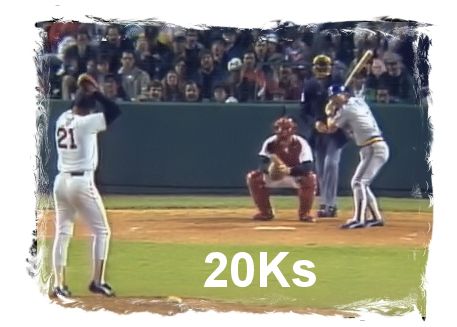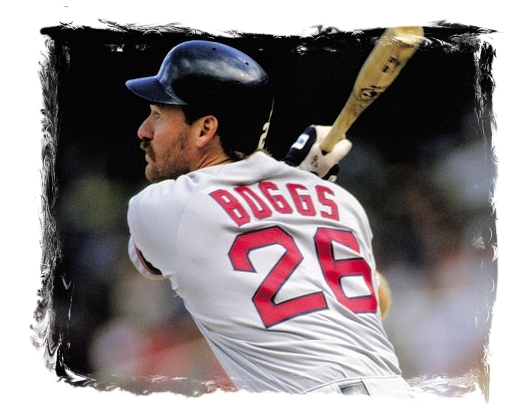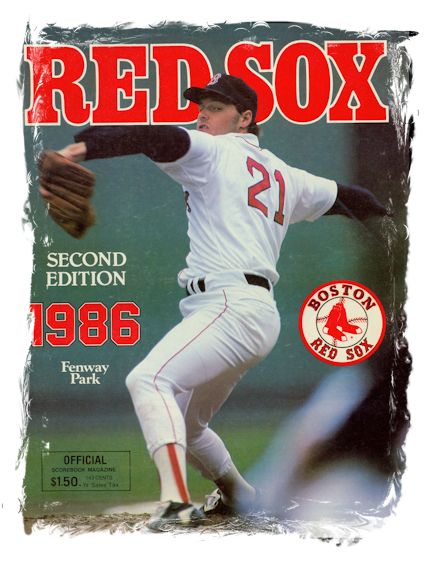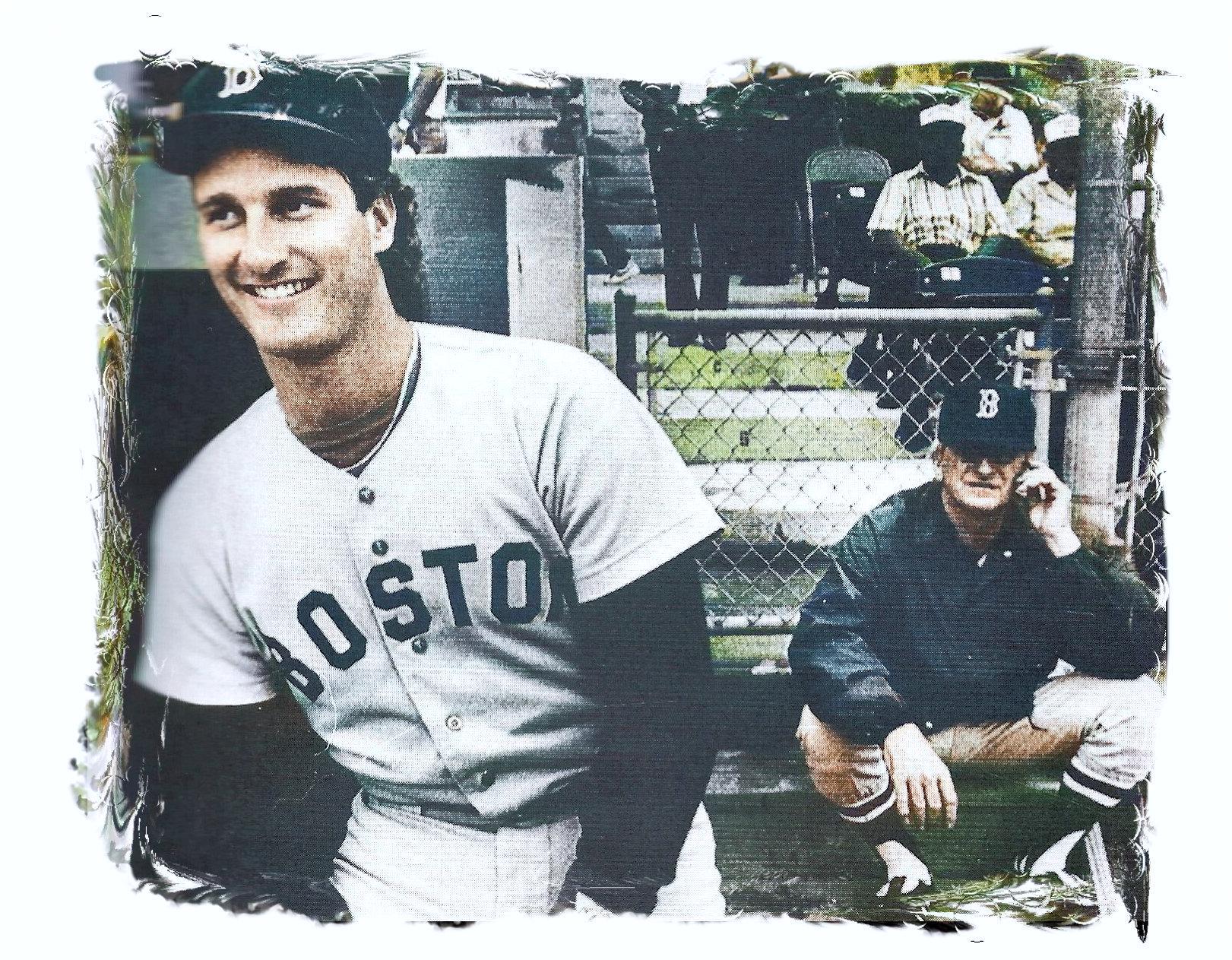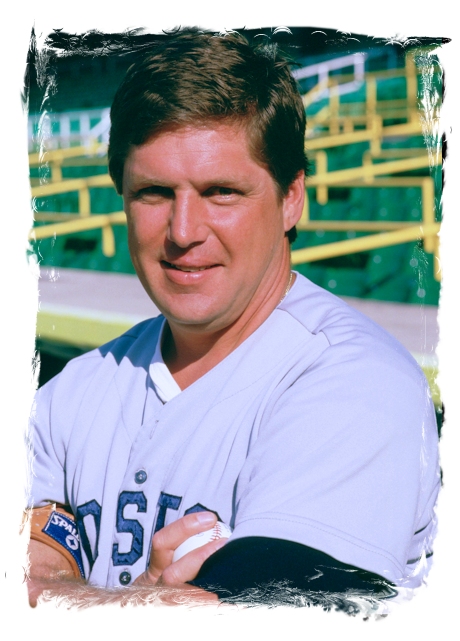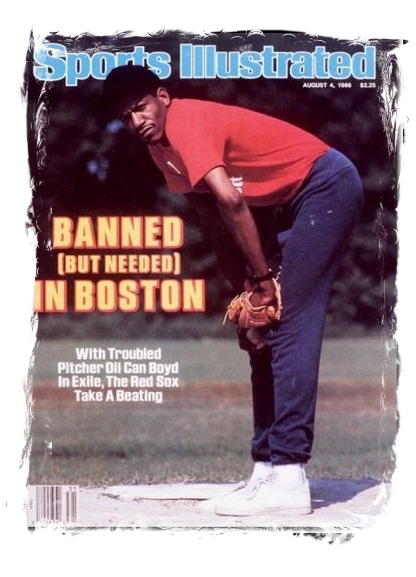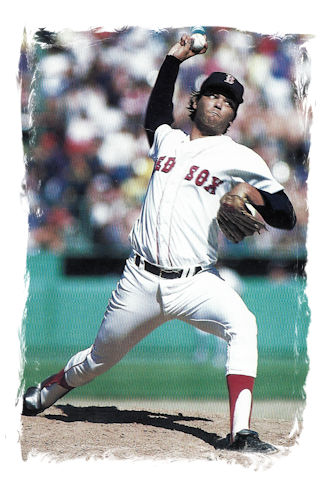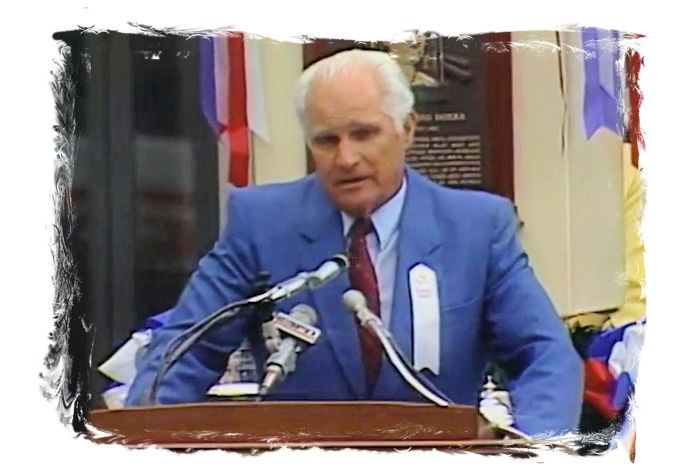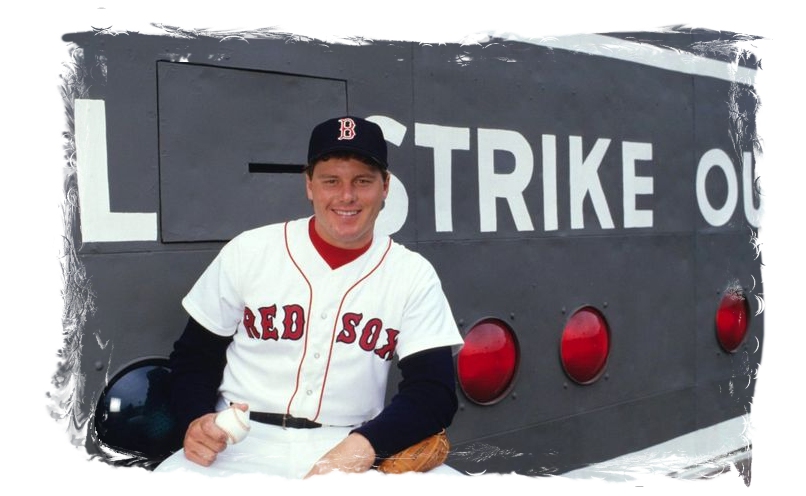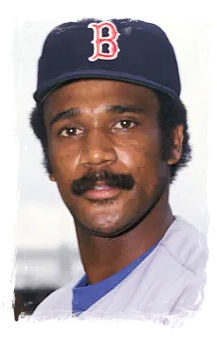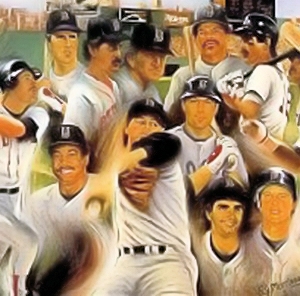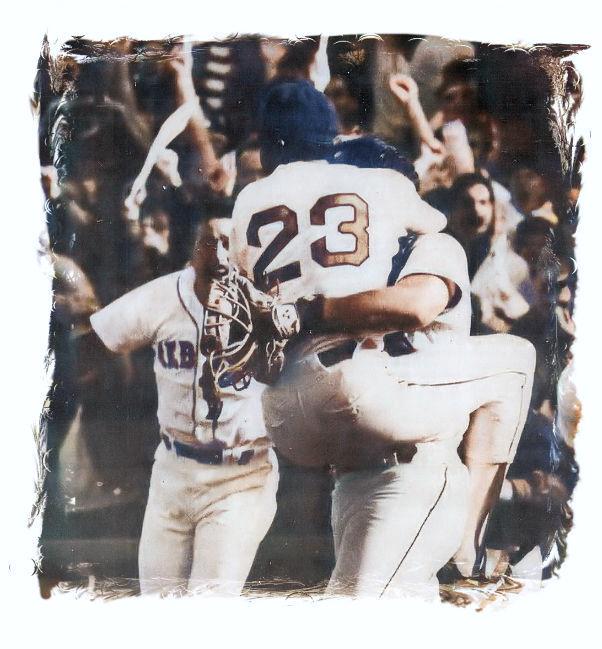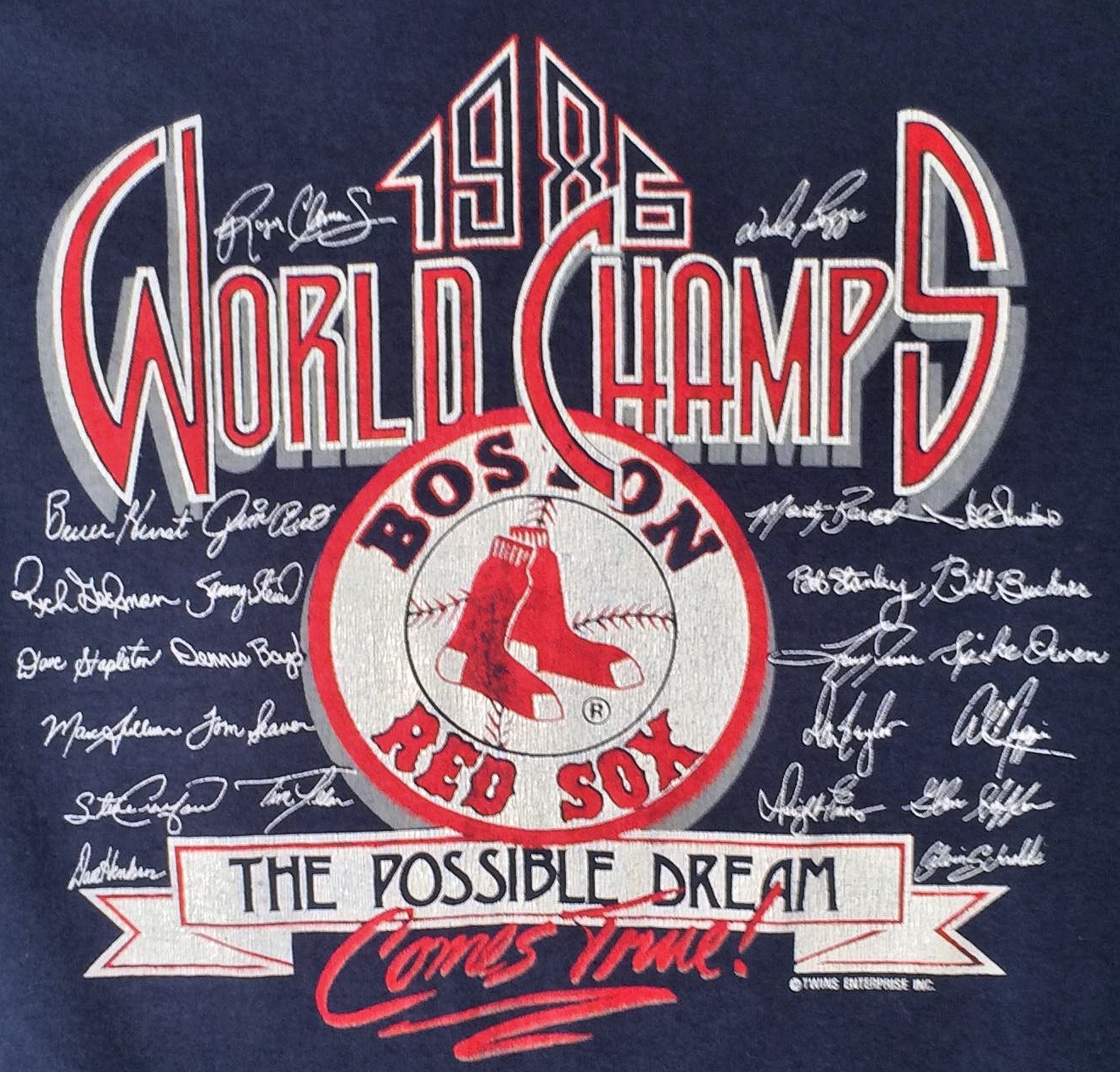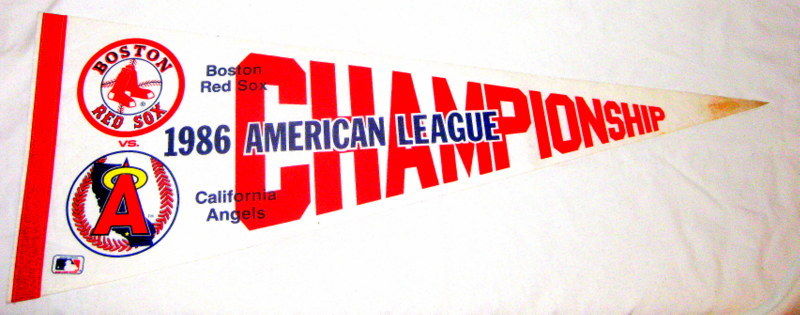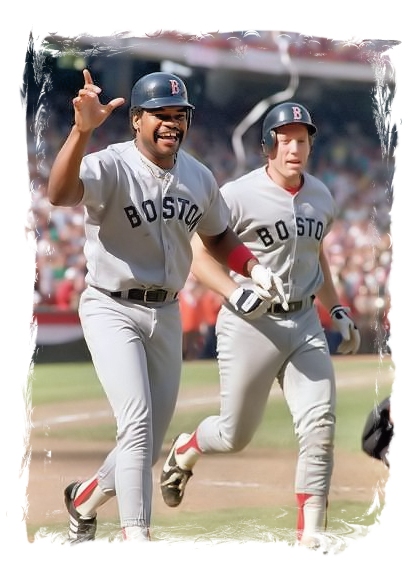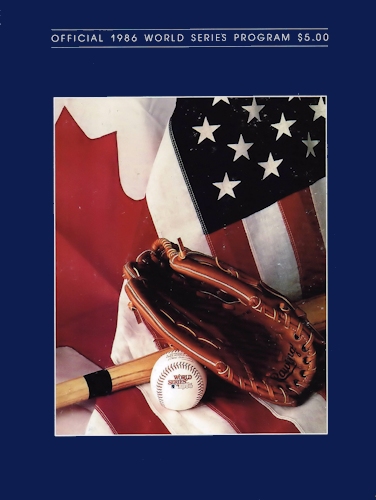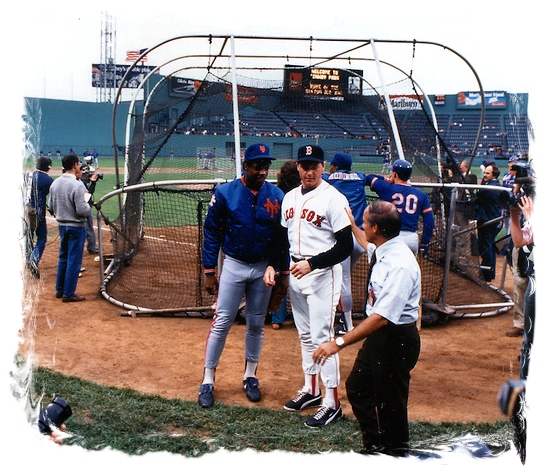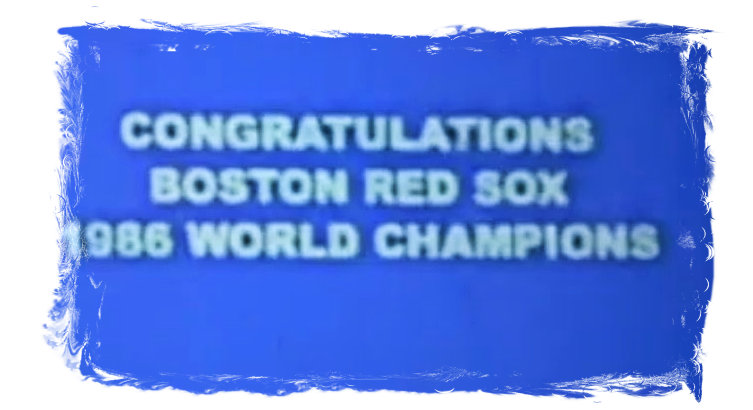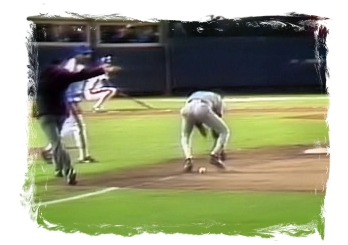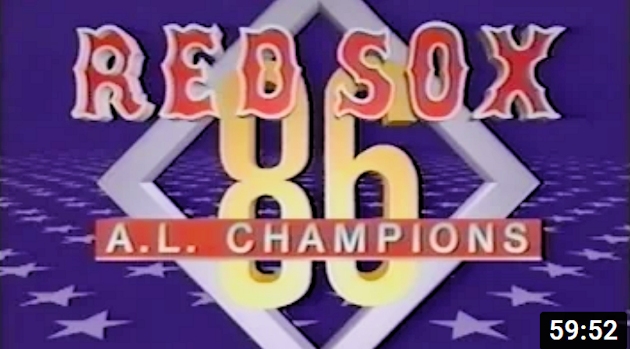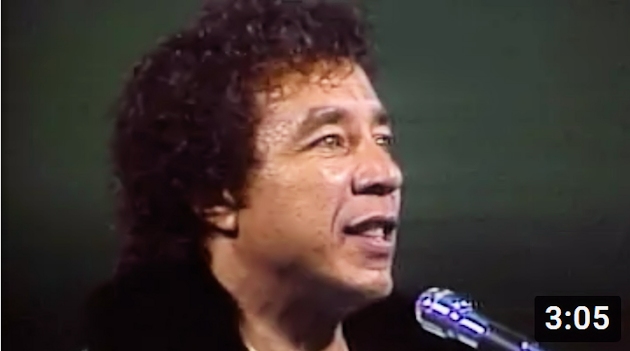|
1986 BOSTON RED SOX
The 1986 Red Sox were within one pitch of winning the World Series on three consecutive New York Mets batters in Game #6, and each time, their result was allowing a base hit. With time, Bill Buckner's blame for letting the ground ball go through his legs, in one of the most infamous plays in World Series history, has been deemphasized. Because in the deciding game, the Red Sox held a 3 to 0 lead, only to lose 8 to 5. It was one of the most agonizing World Series defeats in the history of the Red Sox. But the season would be remembered as the one that re-energized the region's love for baseball. With the boring Sox teams of the early eighties, Larry Bird and the Celtics had won the fans' hearts with championships, Marvelous Marvin Hagler boxed his way to the top and the Patriots played in a Super Bowl. The year started with general manager Lou Gorman adding pitchers Calvin Schiraldi, along with Wes Gardner, in a trade for Bobby Ojeda with the Mets on November 13th. On December 11th, pitcher Mark Clear was traded to the Mets for shortstop Ed Romero. In their second deal of the winter meetings, they picked up left-handed-hitting outfielder Mike Stenhouse from the Twins, for pitcher Charlie Mitchell on December 13th. Shortstop Jackie Gutierrez was sent to the Orioles for pitcher Sammy Stewart on December 18th. The local Elks Club in Winter Haven, FL where the Red Sox trained in spring training, had long given privilege cards to members of the Red Sox, except those who were black. President Haywood Sullivan had said there had been nothing wrong. GM Lou Gorman, however, promptly said the Red Sox would have “no further connection with the Elks Lodge and that he would personally rip up all the Elks passes on the team’s premises.” Tommy Harper, a special assistant to Gorman, had spoken out about it and in December lost his job. Harper, his wife, Bonnie, and his lawyer walked into the Equal Employment Opportunity Commission office in the JFK Federal Building in downtown Boston on January 31st and filed a formal complaint of race discrimination against the Boston Red Sox.
On the field, the Red Sox decided to take a shot, signing 33-year-old left-handed reliever Joe Sambito to a Pawtucket contract and inviting him to spring training on February 1st. "Oil Can" Boyd reported to camp underweight and was sent to the UMass Medical Center. He was found to have a non-contagious form of hepatitis that caused him to tire easily and lose weight. Mike Easler was traded to the Yankees for the charismatic power hitter, Don Baylor on March 29th. Baylor wanted away from the Yankees and loved playing in Fenway Park, where he owned a .350 lifetime batting average. Jerry Remy took the field looking trim and fit on February 15th. After the workout, he received a shot to help reduce swelling in his left knee. On March 4th, he was unable to participate in a workout. He suited up, but could not run due to the swelling in his knee and was back in the clubhouse before the session was half over. Remy's major league career ended. He finished with a .275 career average in 10 major league seasons. When pitcher Bruce Kison hurt his shoulder at the start of camp, he also decided to retire. Calvin Schiraldi was a spring training bust with a 14.50 ERA in five appearances. He was sent to Pawtucket to work his way back with his conversion from a starting pitcher to a reliever. Jeff Sellers was the “talk of the Boston camp” early after his first three starts before his Grapefruit League ERA “swelled to 5.29 and was sent to the PawSox. Roger Clemens, coming off shoulder surgery, got knocked around. In his first five starts, he gave up 29 hits, nine walks and 19 runs. He was too scared to let loose with his fastball until Dr. Arthur Pappas assured him that his shoulder was fine and he found out that his fastball was being clocked at 93 mph. On the last day of spring training, he pitched seven innings against the Tigers and struck out nine batters. The Red Sox were expected to finish in the middle of the pack. They had lost 13 of their 19 exhibition games in spring training.
The Sox started the season on April 7th in Detroit, and when Dwight Evans led off and hit the first pitch from Jack Morris for a home run, it was a harbinger of what would be a great year. Never in the history of major league baseball had someone homered on the very first pitch. But the Sox, who hit four home runs, lost that game and the next one by stranding men on base and because their bullpen couldn't hold their lead. It snowed during batting practice, but Bill Buckner picked up the 2,300th hit of his career on April 10th, as the Sox took the final game of the opening series, by a 4 to 2 score. On April 11th in Comiskey Park, Roger Clemens won his first game since August 3, 1985, 7 to 2. He threw 129 pitches and came within one out of registering his first complete-game victory since May 17, 1985. Most significantly, it was Clemens' first win since his shoulder surgery last August 30th. Bruce Hurst struck out 11 batters on April 12th but lost a five-hitter in Chicago to Tom Seaver, 3-1. A grueling week on the road ended with a 12-2 thrashing of the Chicago White Sox on April 13th. With the score stood at 11-1 however in the seventh inning, rookie Wes Gardner had taken over to pitch in his first game in a Red Sox uniform. He first gave up a triple to center, then struck out the next batter. A sacrifice fly to right scored the runner from third and the final batter popped out. One run, one hit, none left. The lead was still secure and the Red Sox went on to win. What Gardner did not know then, was that the box score that day would tell all about him for the season. The next day his season was over. Gardner was placed on the disabled list with what team physician Arthur Pappas, described as a muscle separation in his throwing shoulder. The Red Sox had pounded out 16 hits in the game, to record their third victory in four games, evening their record at 3-3. In the six games, they banged out 63 hits, including 11 doubles and 7 home runs and scored 44 runs. The Sox came back home and observed the 75th anniversary of Fenway Park on April 14th. When pitcher, Joe Sambito walked out of the dugout, it was the first time he had been inside the park. Shortstop, Ed Romero's error turned a tie game into a six-run inning and an 8-2 loss to the Royals. Glenn Hoffman was out and Romero was not a major league quality shortstop. After losing their first two home games to the Royals, Don Baylor supplied the fireworks with his 11th career grand slam to give the Sox a 6-2 victory on April 17th. But more important was the pitching of Roger Clemens, who pitched his first complete game at Fenway Park since April 26, 1985. The next day, April 18th, Bruce Hurst out-dueled Tom Seaver in a 2-1 Red Sox victory over the White Sox. Hurst struck out another 11 and now led the American League with 24 strikeouts. On April 19th, "Oil Can" Boyd beat the White Sox 3-2, pitching the fourth complete game in a row for the Red Sox. Mike Brown pitched the Red Sox to a 6 to 2 win on April 20th. He hurled seven innings of five-hit, one-walk baseball. The Sox won 7 of 10 and had allowed two or fewer runs in 8 of the 10 games, leading the league with a 2.62 ERA, and managed to sweep three from Chicago without hitting a home run. Meanwhile, the vaunted Red Sox batters were attacking the ball like conscientious objectors. They had scored only 19 runs in six games since coming home. They managed only 37 hits in 50 innings of the homestand. None of the five players who bat third through seventh was hitting higher than .238. Marty Barrett (.395 BA) was leading the team in batting. The Red Sox hit only two home runs in the six games at home. Roger Clemens ripped off three straight wins, struck out ten batters, and became the pitcher Red Sox fans had been waiting for when he beat the Tigers, 6-4, on April 22nd. Home runs by Rich Gedman, Don Baylor and Tony Armas keyed an 11-hit attack. The Sox next lost two of the three games to the Tigers at Fenway however. The starters had made it into the seventh inning in 14 of 15 games. They had struck out 94 batters, while Sox hitters fanned a league-low 47 times (an astounding 2-1 ratio). Bruce Hurst led the league with 33 strikeouts. The staff was on a 1,000-strikeout pace. In Kansas City for a brief trip, the Sox and Royals split two games. On April 26th, the Sox beat the Royals, 6 to 1. Al Nipper was the master with a four-hitter and a 6-1 win. Dwight Evans had three of the Sox's 12 hits, which included Bill Buckner's first homer of the season.
The Elton John song "Rocket Man" blared on the loudspeakers when Roger Clemens took the mound on April 29th. It was a nickname that would stick with him forever after this performance. Clemens had 12 strikeouts after five innings and 14 after six innings, including eight in a row that tied an American League record set by Nolan Ryan, when he was with the Angels and Ron Davis of the Twins. But Clemens couldn't have done it without Don Baylor, who dropped Gorman Thomas' foul pop-up, giving Roger another opportunity to strike him out, which he did. Clemens struck out his 18th batter in the eighth inning and came back to the dugout. Al Nipper surprised him when he told him that with one more, he would tie the record. In the ninth, Roger struck out Spike Owen to tie the record. Phil Bradley was up next and ran the count to 2-0. Roger threw three more fastballs for strikes and Bradley just looked at the last one, as home plate umpire, Vic Voltaggio called the third strike and put Roger Clemens' name in the record book with 20 strikeouts, breaking the record of 19, held by Nolan Ryan, Tom Seaver and Steve Carlton. In 111 years, covering almost 150,000 games, nobody had done what Roger Clemens did that night. The Mariners had put only ten balls in play. Clemens threw 138 pitches, 97 for strikes, struck out the side three times, walked no one, and beat the Mariners, 3 to 1. The ball was saved when it was scooped up by Ed Romero after Ken Phelps grounded to short for the final out and ended up in the Hall-of-Fame in Cooperstown. As much as anything else, the feat re-energized Red Sox nation once again. The following night, April 30th, the Sox rallied to beat the Mariners, 9 to 4. Bruce Hurst, Sammy Stewart and Bob Stanley combined to strikeout 16 Seattle batters, running up a major league record 36 strikeouts in back-to-back games. Clemens' 4-0 start and his record strikeout performance, made him the obvious choice as American League "Pitcher of the Month". He had a 1.62 ERA in 33 1/3 innings, striking out 39.
On May 1st, the Sox swept the Mariners in a 12-2 massacre. "Oil Can" Boyd benefitted from a 12-hit barrage. Wade Boggs, Marty Barrett and Steve Lyons were all good for three hits apiece. The Sox next welcomed the Athletics and took 2 of 3. Mike Brown and Sammy Stewart teamed up to beat the A's, 4 to 3 on May 3rd. Next, Roger Clemens (5-0) beat the A's on May 4th, with 10 strikeouts. Wade Boggs got two hits and raised his average to .337, while Jim Rice extended his hitting streak to 11 games. The win got the Sox to within 1/2 game of first place. A split with the Angels gave the Sox a 6-2 record in the homestand. On May 5th, Bruce Hurst tied them up with a 3-0 shutout. In 1978, Rick Burleson had gone up to Fenway Park PA announcer, Sherm Feller, and asked him not to announce him as "Rick" but as "Richard". Feller obliged him but Burleson struck out three times ... coming back to Fenway now as an Angel player, Feller announced him as "Richard" his first time up, thinking that maybe he would again strike out three times. They had gone 12-5 after a 3-5 start and headed to the west coast. In the Kingdome, on May 7th, the Sox bludgeoned the Mariners, 11 to 5. Wade Boggs, Marty Barrett and Jim Rice each pounded out three hits. Two of Rice's hits were a double and a home run. The highlight however was Al Nipper's one punch that knocked down Seattle's Phil Bradley, who charged the mound after Nipper hit him with a pitch. The Sox swept the two game series from the Mariners winning the next game 4 to 2 on May 8th. Mike Brown struck out eight of the batters on the team he would later be traded to. Rice's hot streak (13 of 14 games, 24 for 63, .381) boosted his average from .196 to .303. Boggs went 3 for 4 and raised his average to .376. Roger Clemens was brilliant for eight innings, on May 9th, striking out 11 in Oakland and tying an A.L. record for strikeouts in three games (41). But in the ninth, he ran out of gas and old reliable Bob Stanley came in to get the 9 to 6 win in the 10th inning. Don Baylor's two-run double highlighted the four runs the Sox scored in the 10th. In the next game, on May 10th, the Sox went another 10 innings to get a win in Oakland, 4 to 2. Bruce Hurst struck out 11 batters again. He had recorded 10 or more strikeouts eight times in his career, tying a Sox record set by Cy Young and matched by Clemens. Jim Rice singled, and in so doing, joined the 2,000-hit club. In that game, Steve Lyons had ignored a hit-and-run sign and also got thrown out of the game for arguing a third-strike call. John McNamara was very vocal about how upset he was with Lyons’ inability to stay focused and control his emotions. The Sox won 11 of their last 13 games and Hurst was awarded the A.L. "Player of the Week". On May 11th, the Sox grabbed first place by sweeping the Athletics, 6 to 5. It was their fifth straight victory, all on the road. Marty Barrett extended his hitting streak to 12 games (17 for 49, .347). The sizzling Sox (20-10) were winners of eight of nine, and 12 of 14. They were 10 games over .500, which hadn't happened since 1984 when they were 86-76. It was the Sox's best start since a 20-9 log in 1982. Their five-man rotation was 17-8 with 182 strikeouts and a 2.81 earned run average for 227 innings. The bullpen had eight saves and three victories.
In Anaheim, the Sox lost two of three to the Angels, but remained in first place, tied with the Yankees as they ended their 6-2 West Coast road trip. The Sox won 8 to 5 on May 14th, behind Clemens. The Sox would never lose more than four straight games and Roger was the reason. Clemens would go on to win 14 times after the Red Sox lost a game. Bill Buckner had the game-winning hit but was still struggling at .199, and his left elbow had kept him in the DH role for four games. Boggs was hitting .365 with 23 RBIs. He was batting .457 (21 for 46) in his last 12 games. The Sox returned home to face Texas. The Sox were not scheduled to play on May 15th and that night the White Sox beat the Yankees. As a result, the Red Sox moved into first place and they would remain there for the rest of the season. In the opener against the Rangers, on May 16th, Bruce Hurst (3-3, 2.79 ERA), the AL strikeout king with 71, struck out 14, a career-high bettered by only five Red Sox pitchers ever. It marked the fourth time this year that Hurst had struck out 10 or more, and the ninth time in his career, tying him with Luis Tiant and Dave Morehead in that category. Hurst now held the career record for Sox lefties and had achieved his previous career high of 11 K's on six occasions. The Sox had scored only one run for him in each of his three losses, and the Rangers won 4 to 1. The next day, on May 17th, the Sox wasted no time in jumping on knuckleballer Charlie Hough, by scoring six runs in the second inning, to give "Oil Can" Boyd an 8 to 2 win. Rey Quinones, in his first Red Sox game, drilled two doubles off the "Green Monster" to lead the Sox batters. Just when Al Nipper seemed to have some momentum, he suffered a severe knee injury in the final game of the Texas series on May 18th. The result was a wound that severed a muscle near his kneecap. As Nipper described it: “I was [ticked off] about throwing one to the backstop with Toby Harrah up and I convinced myself I wasn’t going to let Larry Parrish score. So I blocked the plate and he came and got me in the [right] knee. I made the tag and held up the ball to show the umpire. Then, my leg just collapsed.” Nipper suffered a deep, four-inch gash in his vastus medialis (one of the three major muscles in the kneecap) and was bleeding profusely. Carried by teammates off the field, Nipper was taken to the hospital and underwent emergency surgery that evening. Steve Lyons had already committed an error, overthrown a cut-off man, botched an attempt to bunt, and was picked off first after reaching on a single. But the pitcher threw the ball away and luckily Lyons was on second base with the game tied in the top of the 10th inning. But he then got lost after he thought Ranger's thirdbaseman, George Wright, had caught Marty Barrett's pop-up. He ran back to second, but Wright had dropped the ball and Lyons was greeted by Barrett, sliding into second from the other side. Lyons turned around and took off for third. The confused Rangers threw the ball away, and it ended up in the Sox dugout, allowing Lyons and Barrett to both score, the Sox winning 5 to 4. Rob Woodward was recalled from Pawtucket to take Al Nipper's spot on the roster the next day and Dave Sax was sent to Pawtucket. Trailing 7-6 to the Twins at Fenway, the Sox came up in the bottom of the ninth on May 19th. Two walks and a double loaded the bases before Jim Rice drew another walk, which tied the game. Next up was Marc Sullivan, who had come in to catch, after a pinch runner had replaced Rich Gedman earlier in the game. Sullivan got hit by a pitch in the butt and the winning run was forced across for an 8 to 7 walk-off victory, giving Sullivan his first career game-winning RBI. Wade Boggs reeled off five straight hits in the Red Sox' 17-7 victory over the Minnesota Twins on May 20th and had a chance to tie the club record of six, shared by three players. But his bid for No. 6 in the seventh inning, was a routine grounder to first, which Mickey Hatcher let go through his legs for an obvious error. Boggs, whose 5-for-6 night boosted his average to a major league-leading .383, had collected at least four hits, 21 times in his career. Tony Armas, filling in for the injured Dwight Evans in right, was 4-for-6 and Roger Clemens had reeled off his seventh victory without a loss. On May 21st, Steve Lyons singled in the seventh inning to give Sammy Stewart a 3 to 2 decision. The Sox swept the Twins, winning 5 of their last six games and 14 of their last 18 games, to give them a two game lead in the A.L. East.
The Sox moved into Arlington and after taking 2 of 3 from the Texas Rangers, were in first place by two games. On May 23rd, "Oil Can" Boyd had a no-hitter for four innings and allowed only three hits in a 2 to 1 victory. Roger Clemens breezed to a 7-1 victory on May 25th, flirting with a no-hitter for 7 2/3 innings, before settling for an eight-strikeout (four-walk) two-hitter. The Sox next swept three games in Cleveland. Bill Buckner and Don Baylor homered on May 26th for a 5-3 win. The Sox won a 2-0 game shortened by the fog off Lake Erie the next day, May 27th. The only other fog-shortened game had happened in 1957 at Ebbetts Field in Brooklyn. In the final game on May 28th, the Sox pounded the Indians, 13 to 7. Don Baylor belted the game-winning hit, with his 10th homer and Jim Rice drove in five runs. Baylor hit safely for the ninth time in 10 games (14 for 34, .412). In that span, he had driven in 16 runs and collected 33 total bases. He achieved another milestone, this one more painful, as he became the first American Leaguer to be hit by pitches 200 times in his career. In Minnesota on May 31st, the Red Sox beat the Minnesota Twins, 7-2. By winning, the Sox expanded their lead to 2 1/2 games over New York. But they suffered costly blows when Bruce Hurst went down in agony with a pulled groin muscle, at the end of the fifth inning and had to be carried off the field by teammates. He would be gone for seven weeks. Then Sammy Stewart came in to pitch and also went down when he injured his forearm four innings later. Stewart had pitched 20 2/3 consecutive scoreless innings before going down. Meanwhile, Wade Boggs had his second five-hit game against the Twins in two weeks and raised his average to .402. Without Al Nipper and now Hurst and Stewart down, it was "Clemens and Boyd, then fill the void!" The Sox found that they were forced to use pitchers who had started the year in Pawtucket. But from this point forward, it would be Roger Clemens who stepped up and kept the Sox in first place and ahead of the rest of the AL East. The Sox were 20-6 in May, their best record since a 23-7 month in 1978 and had a 2 1/2 game lead. They had won 10 of their last 11 games and were 17 games above .500 (31-14) for the first time since September 1982, when they were 79-62. The Sox had played at a .793 clip (23-6) since an 8-8 start. Bruce Hurst (89) and Roger Clemens (81) ranked first and second in the American League strikeout list. The Sox led with 322 strikeouts. They also had a 3.32 ERA, the lowest in the league. It was the first time the Sox led the league in ERA since the Babe Ruth team of 1914.
The team took 2 of 3 from Minnesota. On June 1st, Clemens (9-0) again made it look easy in a 6-3 victory over the Twins that brought a happy end to a 7-2 road trip in which the Sox established a lead over the Yankees by 2 1/2 games. Clemens had been hampered by a sore middle finger, but you'd never have known it, as he was able to strike out seven of the first ten batters he faced. His nine strikeouts gave him the AL lead again (90) over Hurst. In the last four games, the Sox batters pounded out 62 hits. On June 2nd, the Sox eeked out a 3 to 1 win with Cleveland as "Oil Can" Boyd, without much offensive support tip-toed in and out of trouble. Don Baylor belted a two-run homer in the next game on June 3rd. Excellent starting pitching from Mike Brown and relief help from Bob Stanley resulted in a 5-1 victory. On June 4th, the Sox beat the Indians, 6-4, and swept their three-game series at Fenway. Rob Woodward was on the mound and beat Phil Niekro, getting run support from three homers off the bats of Rey Quinones, Don Baylor and Bill Buckner. With the sweep, the entire pack in the American League East looked up to see the Sox 4 1/2 games ahead. The Red Sox had won 15 of the 17 games. In that span rookie shortstop, Rey Quinones contributed greatly, with a .275 batting average in 65 plate appearances. The Sox were off to the best start since their pennant predecessors of 1946. Wade Boggs, who hit .609 and slugged .652, was named AL "Player of the Week".
On June 5th in Milwaukee, the Sox entered the top of the ninth inning behind 7 to 3. Rich Gedman and Dwight Evans took old friend Mark Clear deep for home runs with one out. Now down 7 to 5, Clear walked Steve Lyons and then Marty Barrett after striking out Tony Armas. So with two outs and runners on first and second, Wade Boggs, batting an even .400 and with three hits already in the game came to the plate. With the tying runs on base, Lyons for some reason, decided to steal third. He was easily thrown out, ending the game, 7 to 5. McNamara said it was the “stupidest fucking thing” he had ever seen and was tired of Lyons making stupid moves that hurt the team. In Milwaukee, Roger Clemens made his record 10-0 when he shut out the Brewers 3-0 on June 6th. Wade Boggs had two hits and brought home all three runs, raising his batting average to .404. But after losing three of the four games to the Brewers at County Stadium, the Sox saw their lead in the American League East shaved to three games. They had only 26 hits in their four-game stay. As had been suspected, an injury to Sammy Stewart's forearm was serious enough to place him on the 21-day disabled list. Mike Stenhouse had the biggest moment of his Sox career on June 10th. Against Toronto in the top of the 10th inning, with two outs and the bases loaded in a 3-3 tie, Stenhouse drew a pinch-hit walk to bring in the winning run in the 4-3 final. It would be his only RBI of the season, but it earned him the nickname of "Sony" (as in Sony Walkman). On June 11th, Roger Clemens pitched eight gutty innings following a rain delay of 2 hours 47 minutes, showing some of the resiliency that has carried him to an 11-0 record, in this 3-2 win. He tied the Red Sox record for victories at the start of a season, set by Rogelio Moret in 1973, and his six strikeouts raised his season total to a league-leading 104. The Sox took two of the three games with the Blue Jays in Toronto and had a four game lead in the A.L. East. Back home at Fenway on June 13th, Bob Stanley came in to pitch in the eighth inning and retired six straight batters, helping "Oil Can" Boyd win a 5-3 game against the Brewers. Jim Rice had two doubles and was batting .476 in his last six games. Mike Brown got no run support when he lost 2-0 in the next game on June 14th. Wade Boggs had injured a rib when he slipped and fell against a couch in his Toronto hotel room. Boggs lasted only two innings before leaving the game on June 15th, in which the Sox lost. The injury has been described as a "sprained rib". Boggs, who missed one game in Toronto because of the injury, had played with the pain for three games. Then he complained that the pain was causing an "unnatural swing." He was having trouble running and asked to be removed from the game after lining to left in the second inning. Unfortunately, he then had to go to Florida after the death of his mother, who was killed in an automobile accident. The Red Sox had won only three of their last nine games but still enjoyed a 3 1/2 game lead. Next, they went to New York to face off against the second-place Yankees. In the first game of the series, on June 16th, the Red Sox wound up a 10-1 winner. Roger Clemens was given a seven-run lead, as the Sox pounded out 16 hits, including three each by Jim Rice and Tony Armas. It made the "Rocket" the majors' first 12-game winner, and only the 10th man in history, and the first Red Sox pitcher, to start a season with 12 straight victories. In the second game, on June 17th, the Sox escaped with a victory. Before the game Wade Boggs had learned that his mother had died in a car accident and went into a rage. The Sox closed the clubhouse and arranged for Boggs to be flown home with his father, who was at the game. Ed Romero took his place at third base. What looked to be a second straight rout on the field became a survival test as the Sox nearly squandered a pair of five-run leads. Dwight Evans had smashed two long-distance homers, accounting for four runs and the Yankees were beaten again, 7 to 6. On June 18th, Don Baylor victimized his former team, the Yankees. With Marty Barrett on third and Ed Romero on second Baylor belted a three-run double in the ninth inning, giving the Red Sox a 5-2 victory and a three-game series sweep, putting the Sox up 6 1/2 games. The Baltimore Orioles were in third place, a game behind the Yankees, and 7 1/2 games behind the Red Sox. They were the only team the Sox hadn't played yet. On June 20th, they hammered the Sox and Mike Brown, 14 to 3. But the Sox had Roger Clemens on the mound the next night on June 21st. He went eight innings, striking out six and walked three en route to a 7-2 victory over the Orioles, making his record 13-0. It was the seventh time he had won after a Red Sox loss. Clemens led the league in ERA (2.18) and strikeouts (114). The Sox had scored an average of 6.9 runs in his 14 starts. But the Sox lost two of three to Baltimore. The Sox, however, lost two of three to the Orioles and then the next two games to the visiting Yankees. The pitchers had surrendered 39 runs in the last five games. But then on June 25th, Al Nipper returned to the mound after five weeks on the DL. He gutted out seven strong innings and gave the Sox the momentum they needed. Joe Sambito took over for him in the eighth inning and struck out the first three batters he faced. In the ninth, he picked off Rickey Henderson from first, and the Sox won 5 to 4, starting themselves on a six-game winning streak. Sambito had six saves and a victory in 24 appearances. The Red Sox bullpen had 19 saves in 23 chances covering 21 games.
On June 27th, Roger Clemens made his record 14-0 in Baltimore. It was the fifth-best start in major league history. Baltimore's Dave McNally and Johnny Allen were the only men to do better. In 1969, McNally was 15-0 before losing to the Minnesota Twins. Johnny Allen of the Indians went 15-0 before losing to the Tigers on the last day of the 1938 season. Clemens wound up with 11 strikeouts, his fifth double-digit strikeout game of the season, and raised his AL-leading total to 125. Fred Lynn fanned four times against him. It was the fourth time he had struck out a batter four times in a game. The Red Sox had won all 15 games that Clemens had started and Don Baylor had driven in 17 runs in those games. The team rewarded Baylor for his leadership with a contract extension, through the 1987 season, the next day. When the Sox beat the Orioles, 7 to 3 on June 28th, their lead in the A.L. East stood at seven games over the Yankees. "Oil Can" Boyd (10-3) held Baltimore to just two hits in his 7 1/3 innings that game. June 29th's 8-3 victory in Baltimore gave rookie pitcher Jeff Sellers his first win, as he threw a complete game, giving up three runs (two earned) on nine hits. The Sox' eight-run margin was as large as it had been and doubled since two weeks ago. In the dozen games against the Yankees and Orioles, they went 8-4, and did it the hard way, with two sweeps on the road. As June ended, the Sox were 25-6 in games started by Clemens and Boyd. The city of Boston and Red Sox nation got excited when Lou Gorman next solidified the pitching staff, by trading Steve Lyons to the White Sox for 41-year-old, future Hall of Famer, Tom Seaver. Lyons had gone from being a bright young prospect to being an unpredictable permanent resident of his manager’s doghouse and Seaver was one of the best pitchers of his generation. The only person who wasn't excited was Don Baylor, the presiding judge of the Red Sox locker room's "Kangaroo Court". He had filled the Sox cookie jar with money from the misbehavior of Steve Lyons. So Baylor in turn, fined Lou Gorman for trading the team's chief source of penalty income. On June 30th, the Toronto Blue Jays were beaten by the Red Sox, 10-9, in the tenth inning. The Sox pounded out 15 hits and rallied from a 9-5 deficit, winning on a bases-loaded walk to Dwight Evans, that scored Marty Barrett.
Tom Seaver got his Red Sox career off to a good start by being on the winning side of a 9-7 win over the Toronto Blue Jays on July 1st. Joe Sambito got the final five outs to preserve Seasver's first Red Sox win. Seaver bolted out of the dugout to shake Sambito's hand amid chants of "Sea-va, Sea-va" after the final out. To Sambito, it was special. He grew up a Mets fan and wrote a term paper on the "69 Amazing Mets" as a high school senior year back in Long Island. He received a C+ for it he recalled. The next day, after 14 straight victories, Roger Clemens' mastery came to a halt with a 4-2 loss to the Blue Jays on July 2nd. The Sox split their series with the Blue Jays as they completed a string of 29 games against the American League East. They went 17-12 in the stretch, which began June 2nd, and increased their lead from 2 1/2 games to seven. "Oil Can" Boyd lost the next game to the Jays on July 3rd, 8 to 5. But after both Clemens and Boyd lost, Jeff Sellers righted the Red Sox ship with a 6-5 decision over the Mariners on July 4th. Dwight Evans' three-run homer helped him in his first win at Fenway Park. Tom Seaver beat the Mariners, 7 to 3, allowing just four hits in seven innings on July 6th. Tony Armas and Marc Sullivan both homered while Bob Stanley picked up his 14th save. Bill Buckner had four RBIs and now had 13 career game-tying or game-winning hits, when he led the Sox to an 8-7 win over the A's on July 8th. After Oakland took a 4-0 lead on July 9th, the Sox came back to win 7 to 6. The Sox committed three errors to give the A's their lead but pounded out 12 hits to come back, scoring seven runs in the third inning. Jeff Sellers earned his third straight win. On July 10th, against the Angels, the Red Sox won a ballgame with an implausible, if not downright incredible, rally. Jim Rice hit a two-run homer and Rich Gedman rapped a run-scoring single in the bottom of the 12th to lift the Red Sox into a 7-7 tie and made for a most unpredictable climax. With runners on second and third, California reliever Todd Fischer was prepared to throw his first pitch to Rey Quinones, but never got the chance as plate umpire Joe Brinkman called a balk and waved home Dwight Evans for the victory in this clash of American League division leaders. As the All-Star break approached the Sox were in first place with a seven-game lead. Seven times in the previous 14 years, the Sox had been in first place at some time in the second half of the season and had only one divisional crown to show for it. And what happened next, knocked the team down a peg and gave them the most stressful part of their season. American League All-Star manager, Dick Howser named Roger Clemens the AL starter for the game on July 15th at the Astrodome. Clemens wasn't the only Red Sox player putting together a good first half. Rice, although his power numbers were down, was hitting over .330, while Don Baylor had knocked out 15 home runs.
Each All-Star team had to pick a player from every team in the league and every player had to be eligible to play on that Tuesday and "Oil Can" Boyd (11-6) was scheduled to pitch in the last game before the break, so Dick Howser, the AL manager, didn't choose him. When Boyd learned that he had not been selected to be on the team, he snapped at what he took as a snub. He was in financial trouble and making the All-Star team would have earned him a much-needed $25,000. He went into a fit of rage, stormed out of the clubhouse, threatening to go home to Mississippi, and thereby infuriating John McNamara and his teammates. On July 11th, he was suspended without pay, for a minimum of three days. The Boston black community shouted "racism", but Don Baylor disputed the charge, saying that Boyd would have been thrown off the team if he had played elsewhere. Boyd, who was seen as one who always had an excuse after not pitching well and a crybaby, by many of his teammates, apologized to the team two days later. But Baylor and many of the others on the Sox didn't want to hear it anymore. The club intimated that he was on drugs after he had gotten into a tussle with some undercover narcotics detectives outside his home. After meeting with Lou Gorman and Haywood Sullivan, Boyd agreed to be hospitalized for evaluation and drug testing at the UMass Medical Center. Roger Clemens started the 57th All-Star Game, pitching the maximum three innings and facing the minimum nine batters as he captured the victory in the American League's 3-2 decision over the National League. He came through with one of the tidiest efforts in All-Star history. Clemens threw 25 pitches, 21 for strikes. He tossed 14 straight strikes at one juncture and retired four men who have won National League MVP awards. He struck out only two. He won the Most Valuable Player trophy, and on a night when Fernando Valenzuela of the Dodgers struck out five batters in a row, that is an honor. Clemens was the 26th Red Sox pitcher chosen for an All-Star Game and the fifth to start one. The other Sox pitchers to start an All-Star game were Lefty Grove (1936), Mel Parnell (1949), Bill Monbouquette (1960) and Dennis Eckersley (1982). Named as reserves were Wade Boggs (1 for 3), Jim Rice (0 for 1) and Rich Gedman.
Coming out of the break, the Sox went into their biggest slump of the season thus far. The slump started when Boyd exploded, and then continued on the road. On July 19th, Calvin Schiraldi was called up from Pawtucket and given the Sox "closer" role. With the PawSox, Schiraldi had 12 saves, a 2.86 ERA with 60 Ks, in 44 innings as a short reliever. He was the ninth player the Sox had to bring up from AAA so far this season. After losing three straight games, Roger Clemens helped the Sox finally win and improved his record to 16-2, with a 9-4 victory in Seattle. But then the Red Sox went on another losing streak on the West Coast. On July 21st, Bruce Hurst came off the DL, started the game against the A's in Oakland, and lost 5 to 2. The major-league career of Mike Stenhouse ended on July 23rd. He grounded out to end a 9-2 loss against Oakland. It was the Sox’s fourth straight defeat and the first time they had been swept in a series. The team decided to replace Stenhouse on the roster with Mike Greenwell. In Anaheim, Roger Clemens stopped the losing streak when he beat the Angels, allowing just two hits in an 8 to 1 win on July 25th. Rich Gedman belted his second career grand slam to highlight a five-run rally in the fifth inning. Tom Seaver lost to the Angels on July 27th. He had allowed but three runs in his last four starts, covering 25 2/3 innings, but he had lost three of them, and the Sox had been shut out twice while he was working. Al Nipper lifted the Red Sox with a 3 to 1 victory in Chicago on July 28th. He became the first pitcher to win a game, other than Clemens, since July 10th. The Sox only got four hits, but two were homers by Don Baylor and Dwight Evans. The road trip was not good for the Red Sox, who won only three of the 13 games they played. They were a mess. The staff ERA, not including Clemens, was 5.52. They had scored only 21 runs in the 10 losses on the road trip and were batting under .200 with men in scoring position. Only Clemens was a major beneficiary of runs with 22 in his four starts. The dismal hitting on the trip resulted in a team batting average of .228 ... Marty Barrett .220 (11 for 50); Wade Boggs .229 (11 for 48); Bill Buckner .226 (12 for 53); Jim Rice .286 (10 for 35); Don Baylor .229 (11 for 48); Dwight Evans .283 (13 for 46); Rich Gedman .209 (9 for 43); Tony Armas .154 (2 for 13); Kevin Romine .231 (3 for 13); Ed Romero .183 (1 for 12); Rey Quinones .156 (5 for 32); others .079 (3 for 38). Don Baylor only had two home runs in six weeks and Armas was injured with LaShelle Tarver and Romine as his inadequate replacements. The Sox fielding percentage also was a league-low .975. They had committed 99 errors in 102 games. Rey Quinones was an error-making machine at shortstop and Gedman wore out a patch to the backstop, chasing balls that got by him. At the end of the month, they had won 10 and lost 16. The media, especially in New York, was comparing the slump to the Sox collapse in 1978. But they were 59-41 and still in first place by four games over the Yankees.
The Sox returned to Fenway and "Oil Can" Boyd was reinstated. They took two of three from the Royals. On August 1st, backed by two runs batted in apiece by Bill Buckner and Jim Rice, as well as a home run by Tony Armas, the Sox tagged a 5-3 defeat on K.C. The luckless Tom Seaver lost the middle game on August 2nd. Seaver was 0-4 in his last five starts, and the Sox had scored only five runs for him. He was 2-4 with the Red Sox but had done the job they wanted him to do. His Red Sox earned run average was 3.57 and he had pitched at least six innings in each of his seven starts. He walked off the mound with a 2-1 lead in the seventh inning, only to see Bob Stanley and Tim Lollar turn it into a 13-2 loss. The Sox were 7-20 in the games where Lollar (6.08 ERA) was given the ball. On August 3rd, with the Sox up 5 to 3, McNamara turned to Calvin Schiraldi (0.57 ERA in six appearances). He provided the big lift by coming into a two-on, one-out jam in the ninth and retiring three straight Royals and two on strikeouts. Al Nipper got the win and Wade Boggs had two hits, while Dwight Evans had two doubles and a single.
Meanwhile, in Cooperstown, Bobby Doerr was enshrined in the Hall of Fame along with Willie McCovey and Ernie Lombardi. At 86, Doerr became the oldest HOFer. However, back home, the Red Sox lost two to the White Sox and saw their lead drop to 2 1/2 games, their slimmest margin since the beginning of June. Roger Clemens lost a 1-0 pitchers duel on an unearned run on August 4th, and "Oil Can" Boyd made his first start since coming back on August 5th. After counseling, Boyd felt that he had learned a lot about himself. Off the field, "Oil Can" Boyd stated that he was taking drug "tests" every five days to clear the air about his physical condition. Boyd's tests were supervised by Arthur Pappas, the team physician. On the field, Boyd came back from exile, kept his mouth shut, and pitched very well but lost, 3 to 1. Bruce Hurst finally won and shut Chicago out on three hits, 9-0, on August 6th. The Sox bats came back to life with 15 hits with seven runs in the first two innings. Next, the Sox had to take on the red-hot Tigers in Detroit, who were 13 games back at the All-Star break and now sat just 4 1/2 games behind the Red Sox, in third place. In the first game, Tom Seaver was brilliant on August 8th, winning 6 to 1. He retired 11 straight from the third through the seventh and 17 of 18 from the first through the seventh. He took a one-hitter into the seventh and had at least one strikeout in every inning after the first. Thanks to Wade Boggs (4 hits, 2 walks) on August 9th, the Sox beat the Tigers again, 8 to 7. The next day, on August 10th, the Sox had blown a 4-0 lead and trailed the Tigers 6-4, in the eighth inning. Don Baylor homered and the Sox loaded the bases for Rich Gedman who belted another homer. His grand slam brought the Red Sox back, to win 9 to 6. After winning four straight, the Sox lead was back up to six games. They lost the next three games before beating the Royals, 5-3 on August 13th, in Kansas City. Tom Seaver struggled in the early going but pitched like the veteran he was after settling in, going 7 2/3 innings and getting some help from Calvin Schiraldi. It was Seaver's 310th career victory. Schiraldi, meanwhile, had pitched 21 1/3 scoreless innings and had a 0.40 ERA. On August 14th the Sox knocked out 18 hits that carried the Sox to an 11-6 win over the Royals. Tony Armas had four RBIs with a three-run home run. After splitting the series with the Royals, the results extended the Red Sox American League East lead to four games over the Yankees. The Sox finished with a 5-3 record on the road trip.
Roger Clemens (18-4), who was 0-2 in his last three starts, finally got his 18th victory on August 15th, with an 8 to 5 win over the Tigers at Fenway. It was the most wins by any Red Sox pitcher since Dennis Eckersley won 20 in 1978. But for his first 15 starts, 14 of them victories, Clemens finally getting the 18th win can be considered vaguely disappointing. "Oil Can" Boyd, on the other hand, found himself in the same kind of slump that plagued Al Nipper and Bruce Hurst after their injury layoffs, losing to the Tigers, 12 to 6, on August 16th. Since his reinstatement, Boyd had a 0-3 record. He had allowed 21 hits and 13 earned runs in 19.2 innings. On August 17th, the Sox beat Detroit, 7 to 5. Calvin Schiraldi (0.69 ERA) pitched 3 2/3 innings and got his first major league win. Dwight Evans' run-scoring single gave him the Sox lead with 74 RBIs. Meanwhile, Lou Gorman worked a trade with the Seattle Mariners to shore up the Red Sox defense and depth. He acquired outfielder Dave Henderson and shortstop Spike Owen, for shortstop Rey Quinones, pitchers Mike Brown and Mike Trujillo, and a minor league player to be named later. It would be the final piece that completed the Red Sox. The Sox next went on to take 2 of 3 in Minnesota, as Wade Boggs battled Kirby Puckett for the lead in the A.L. Batting race. On August 18th, Tom Seaver stifled the Twins, 3 to 1, as Rich Gedman put the game away with a two-run homer. After losing the next game, the Sox hitters gave Roger Clemens more than enough of a cushion, as he two-hit the Twins, 9 to 1 on August 20th. Jim Rice, Dwight Evans and Don Baylor all belted home runs, while Boggs (.351 BA) collected three hits in five trips, to regain his leadership in the A.L. batting race. Then in Cleveland on August 21st, the Sox exploded, beating the Indians, 24-5. The Sox stroked 24 base hits, which like the 24 runs was a major league high this season. Tony Armas drove in six runs with a grand slam and a two-run homer. His seven at-bats tied an AL record for a nine-inning game. Spike Owen tied Johnny Pesky's American League record of six runs in a game. In the sixth inning, the Red Sox set a team record by scoring 11 of their 12 runs after two were out. At one point, 11 straight batters reached base, one short of the American League record. The Sox had scored more than 24 runs only once, a 29-4 win over St. Louis on June 8, 1950. In Cleveland the next night, the Sox clawed back from a 3-1 deficit to overtake the Indians, 6 to 3 on August 22nd. Bruce Hurst scattered seven hits over 6 1/3 innings and was picked up by Calvin Schiraldi. Don Baylor brought them back with a clutch two-run single in the fifth and later sealed the deal with a homer. The Sox lost the next two however and ended up splitting the series in Cleveland and moved on to Texas, where they won on August 26th by a score of 8 to 1. "Oil Can" Boyd struck out ten batters. But the Sox lost two of three in Texas and returned home with a 6 1/2 game lead. They were 18-22 in their last 40 games but had lost only 1/2 game in the standings. Back at Fenway the Sox lost the opening game of the Cleveland series. Then on August 30th, Roger Clemens (20-4) won his 20th game, beating the Indians 7 to 3, and striking out 11 and notching his 207th strikeout of the season. He became the Red Sox's first 20-game winner since Dennis Eckersley in 1978 and the fifth Sox pitcher to reach 200 Ks in a season. Despite of the ups and downs since the All-Star break, the Sox had weathered their slump and fans started getting nervous with anticipation and excitement about making it to the World Series. With 20 games remaining, the Red Sox held a lead of 3 1/2 games over the Toronto Blue Jays. Bot now the Sox then ran off a 12-game winning streak that would push them over the top for good. It started on August 31st when the Sox came from behind and scored three in the seventh to tie the game. They next watched Calvin Schiraldi face five Cleveland batters, with four strikeouts, and rallied for the walk-off game-winner in the ninth, on Don Baylor's two-on, two-out bloop flare, 4 to 3.
The next night, September 1st, down two runs, the Sox rallied for three runs in the third, another in the fifth, and two in the seventh, then withstood a ninth-inning, two-out home run derby by the Rangers to gain a 6 to 4 victory. Again on September 2nd, Don Baylor was the savior, when he hit a home run over the left-field wall in the sixth inning, a two-run shot that erased a 5-3 Texas lead. Then Marty Barrett's bases-loaded single gave them an 8 to 6 win. Wade Boggs stepped into the hero's role on September 3rd. The Sox came back in the bottom of the ninth for a 4-3 victory over Texas, on a run-scoring walk-off double by Boggs. The win went to Bob Stanley, who had blown so many games, that he became a joke in Boston. He came in for Tom Seaver with a 3-2 lead and blew this one also, letting the Rangers tie the score before Boggs saved him. It was the 100th of Stanley's career and it completed a three-game sweep over the Rangers, all come-from-behind wins.
Roger Clemens won his 21st game on September 5th, 12-2 over the Minnesota Twins, as the Sox had five straight come-from-behind wins, running their winning streak to six games. In the game, the Sox scored 12 runs and had 11 hits, including a grand slam home run by Jim Rice, the fifth of his career. In the second game of the series on September 6th, rookie Pat Dodson entered the game to play first base in the ninth inning in a game tied against the Twins. With two outs in the bottom of the inning, Dodson grounded the ball between first and second for an infield single. Dave Henderson ran for Dodson and scored on a walk-off single by Marty Barrett, 3-2. Rice picked up three more hits to raise his average to .329. He had 12 RBIs in his last 10 games and 52 multiple-hit games. There were fifteen hits, including the second grand slam in three days by the sizzling hot bat of Rice on September 7th. Enemy runners were cut down at the plate on successive plays when there was still no score. A complete game, no-walk 9 to 0 shutout by Bruce Hurst completed a sweep of the Twins and a wildly successful 8-1 homestand. Jim Rice had gone 7-for-12 with 10 RBIs in the three games. The team next traveled on to Baltimore where they grabbed their ninth straight win in 11 innings, 9 to 3, scoring six runs in the eleventh highlighted by Bill Buckner's tie-breaking double, on September 8th. Calvin Schiraldi picked up the win after blowing Tom Seaver's 3-1 lead in the ninth inning. Rich Gedman doubled and slashed a three-run homer in the inning, adding the insurance runs the Sox needed. The Red Sox had won 16 games on their final at-bat and had hit .323 (102-316) and outscored opponents, 62-26, with two errors. The staff ERA was 2.82 and their lead in the AL East was at seven games. On September 9th, a 7-5 victory gave the Sox their 10th straight win, behind two homers from Dwight Evans after the Sox fell behind, 4 to 1. That gave him 700 extra-base hits in his career, putting him behind just Jim Rice, Yaz and Ted Williams. Their next victory on September 10th, 9-4 over the Orioles, gave them eleven straight for the longest winning streak since 1977. It was the ninth time in the last ten games the Sox had come from behind and the 37th time they did that this season. Bill Buckner had four hits in five times up and Jim Rice's fourth hit, a single in the 7th inning, was his 12th game-winning hit of the year, giving the Sox a 9 to 4 triumph. All good things must end and the Sox had the winning streak end the next game when Baltimore rallied to win, 8 to 6 on September 11th. Bill Buckner hit two home runs that had given "Oil Can" Boyd a 5 to 2 lead before the O's came back. The Red Sox had a 3 1/2 game lead in the AL East when it began, and they left Baltimore when it ended, with a nine-game lead over the second-place Blue Jays. In the stretch, the Red Sox hit 32 home runs in 20 games and Rice had gone 18-for-46 with five home runs. In New York, Bill Buckner belted two more homers to put the Sox back in the win column on September 12th, 7 to 2. He drove in four runs, sending home an insurance run in a four-run eighth. He had seven home runs and 15 RBIs in his last eight games. At the start of September, Buckner was hitting .257 and struggling. Since then he had been on a .435 spree (20 for 46) and now had a career-high 17 home runs and 98 RBIs being named American League "Player of the Week". The next day, an incident happened in New York that brought the team together even more. On September 13th, Jim Rice and Spike Owen both chased down a fly ball headed toward the left-field stands in Yankee Stadium. The two collided but Rice held on to the ball, losing his cap to one of the Yankee fans. Rice wanted it back and endured a couple of racial slurs thrown his way by the culprit with his cap before he took off. Rice was over the wall, followed by Don Baylor, Al Nipper, Roger Clemens, John McNamara and several more of his Red Sox teammates. The Sox lost the game, 11 to 6, but they got the cap back. Roger Clemens won his 23rd game on September 16th, 2 to 1, allowing six hits and walking one batter, as the Sox took a doubleheader from the Brewers. Dwight Evans broke a 1-1 tie in the first game to get the win and Jeff Sellers pitched his way out of two jams in the second game to hold for a 9 to 3 win. Clemens, who pitched his 10th complete game, had won more games than any Red Sox pitcher in 37 years. With 10 more strikeouts, he led the American League with 2227 and tied the club record of eight games with at least ten or more strikeouts in one season. Jim Lonborg had set that record in 1967. For his career, Clemens had 10-plus strikeout games 12 times. In winning his 23rd game, he became the biggest Red Sox winner since Mel Parnell won 25 games in 1949.
The team was now 23-9 in one-run games and had come from behind to win 39 times this year. They had scored the winning run in their final at-bat 17 times this season. On September 17th, "Oil Can" Boyd beat the Brewers, 4 to 1 at Fenway. In New York, the Mets clinched the NL East at Shea Stadium. The Sox completed a four-game sweep of Milwaukee with a 7-1 victory on September 18th. For the 10th time in his career, Bruce Hurst struck out 10 batters or more, tying Jim Lonborg and Ray Culp on the Red Sox's all-time list. Only Joe Wood (18) and Clemens (12) have accomplished the feat more times. Wade Boggs walked for the 100th time this season, a career-high. He also had his 44th double, tying his career best. With a 20-game hitting streak, Boggs became only the second Red Sox hitter since 1951 to hit in at least 20 straight games twice. Boggs had a 28-game streak last year. The other was Fred Lynn in 1975 and 1979. Tom Seaver was the pitcher on September 19th in Toronto. In the fourth inning, he felt something pop in his left knee. He didn't know it at the time, but he had torn the ligament in his knee. He never threw another major league pitch, retiring when the season ended. Before the game on September 20th, a bomb threat was phoned into the Red Sox clubhouse and it was quickly evacuated. Nothing happened and the fans in the stadium were never made aware of the situation. Roger Clemens won his 24th game on September 21st, 3 to 2 over the Jays, as Rich Gedman and Dwight Evans gave him the runs he needed with home runs. Babe Ruth was the last Red Sox pitcher to win 24 games, in 1917. Clemens was leading the league in strikeouts (232) and ERA (2.55) and was the AL's only 20-game winner. Wade Boggs, in the meantime, was getting very little attention in his quest to win the batting title. He had a 20-game hitting streak snapped and had gone 1 for 12 in Toronto, but was still batting .346, second to Don Mattingly, who was hitting .351 with 12 games left. Jim Rice was hitting .324. His power totals were down as late as mid-August, but after a recent surge, he was up to 20 home runs and 107 RBIs, both close to his career averages. He was batting .643 (36 for 56) with runners in scoring position and less than two out. Clemens failed to get his 25th win when he was matched up with Toronto's Jimmy Key in a pitcher's duel on September 26th. Calvin Schiraldi came into the game in the 10th inning and gave up a game-winning homer to Jesse Barfield for a 1-0 loss. Wade Boggs had four hits in six trips to lead the AL batting race with a .354 average.
Bruce Hurst made his Fenway Park record, 6-0 with a 1.68 ERA and 49 strikeouts in 53 2/3 innings, on September 27th when he shut out the Blue Jays, 2-0. He had completed six of his last seven starts at Fenway Park and won five straight starts with four complete games. He had 67 percent of the Sox' 1986 shutouts (4 of 6), and in his last 36 innings had allowed only three earned runs while walking three and striking out 33. Finally on September 28th, "Oil Can" Boyd rang up a pair of strikeouts in the first two innings and the Sox scored five times in the second inning led by Rich Gedman's double. Boyd threw a one-hitter, and the Red Sox beat the Blue Jays, 12 to 3, to clinch the American League East title. Roger Clemens, raised on a ranch in Texas, mounted one of the Boston Police horses and galloped around Fenway Park to highlight the celebration. All that was left was Wade Boggs chasing the batting title with Don Mattingly. On September 29th doubles by Boggs (.353 BA) and Marc Sullivan gave the Sox a 7-5 win over the Orioles. Sullivan had three hits for the second time in his career and Boggs collected his 200th hit for the fourth straight year, a first for any Red Sox player. On September 30th, Boggs went 4-for-4 with his 311th double of the season, breaking the Red Sox record. But then he pulled his hamstring and sat out the remaining games of the season, still having enough of a lead to get the batting crown with a .357 BA over Don Mattingly's .352 BA. In the second inning of Roger Clemens' final regular-season start on October 1st. He was hit on the elbow by a line drive off the bat of Baltimore catcher John Stefano. His arm went numb and Sox fans' hearts sank. X-rays were negative but it reminded fans of when Ted Williams was hit by a pitch before the 1946 World Series.
The ALCS was played by clubs obsessed by their past. The California Angels were managed by Gene Mauch, who was still haunted by his experience as manager of the Phillies, who blew the pennant in 1964. Despite the loss of Tom Seaver to a knee injury, Roger Clemens made the Red Sox the favorite.
In a radio interview
on the eve of the championship series,
Lou Gorman defended the club's
policy of limiting pitchers to two-year contracts, citing that
Clemens was
a question mark because of his elbow. The unnecessary comment annoyed
Clemens and he responded with his worst performance of the season in
Game #1
of the ALCS, as the Angels beat him 8 to 1, behind Mike Witt's five-hitter. Witt The Red Sox came back to win Game #2 behind
Bruce
Hurst, F
The Red Sox lost Game #3, by a score of 5 to 3. In Game #4, Roger Clemens carried a 3 to 0 shutout into the ninth. Then after giving up a leadoff home run and two singles, McNamara turned the game over to Calvin Schiraldi, who had been almost untouchable. But In Game #5, with Bruce Hurst pitching, the Red Sox nursed a 2 to 1 lead into the sixth inning. Then Dave Henderson, who entered the game as a defensive replacement when Tony Armas sprained his ankle, lost a fly ball in the sun and the Angels tied the game. Bobby Grich then slammed a long fly ball to center field and Henderson went back to the fence, jumped, and caught the ball, only to have it knocked loose when his hand hit the fence. It fell to the other side for a home run, giving California a 3 to 2 lead.
Entering the ninth, with the Angels leading 5 to 2, Bill Buckner singled and Don Baylor homered to make the score 5 to 4 with one out. Dwight Evans then popped out and with the police circling the field to protect it from an impending celebration, Gene Mauch brought in left-hander Gary Lucas to face Rich Gedman. But Lucas hit Gedman with a pitch and the Sox stayed alive. This brought up Dave Henderson, with a chance to redeem himself. Mauch called for Donnie Moore, who had saved 21 games that season. Henderson worked the count to 2-2 on a series of fastballs. The Angels were one strike away but Moore put the ball over the plate only to see Henderson jerk it in the air toward left. He danced and jumped on his tip toes as the ball sailed eight rows deep into the left-field stands, giving the Sox a 6 to 5 lead. In the bottom of the ninth Bob Stanley and Joe Sambito failed to put the game away, as the Angels tied it up and the game went into extra innings. But in the 11th, the Sox loaded the bases with no outs. Henderson lifted a fly ball to center that scored Don Baylor, and Schiraldi got through the 11th, giving the Sox a chance to live another day. "Oil Can" Boyd won Game #6
Roger Clemens, with a
touch of the flu, held the Angels to four hits over seven innings and
sparked the Sox
in Game #7. T
Going into it, the Mets got all the publicity and they were heavily favored to win the World Series. Back in Boston, everyone was convinced that this was a team of destiny and would break the "Curse of the Bambino". Wade Boggs called his club a team of magic, and Calvin Schiraldi was ecstatic to have the goat horns removed. The Red Sox players tried to stay focused and deflected any talk about fate. The pitcher in Game #1 was Bruce Hurst, and his brother pleaded with him to not embarrass the family, a quip that Joe Garagiola and Vin Scully picked up on while broadcasting the game on NBC. Hurst pitched eight full innings, allowing just four hits and striking out eight, as he and Calvin Schiraldi combined for a 1 to 0 shutout. The Mets had runners in scoring position five times and unsuccessfully brought them home. In the seventh inning, Jim Rice walked, advanced to second on a wild pitch from Ron Darling, and scored when Mets second baseman Tim Teufel, allowed Rich Gedman's grounder to go between his legs. In Game #2, Roger Clemens and Dwight Gooden faced each other in a pitching showdown, but neither one made it past the sixth inning. The Sox, however, knocked out 18 hits and breezed to a 9 to 3 victory and a 2 to 0 lead in the series. Gooden was victimized for six runs and eight hits, a team World Series record. Included among the assaults were homers by Dave Henderson and Dwight Evans. Back the teams went to Fenway Park for Game #3,
and Bobby Ojeda beat
"Oil Can" Boyd. In Game #4,
John McNamara elected
to go with
Al Nipper, who was beaten by Ron Darling to tie up the series.
Game #5 pitted
Bruce
Hurst against Dwight Gooden. As the teams traveled back to New York, everything seemed to be lining up in favor of the Red Sox. Roger Clemens was ready to pitch, Dave Henderson was playing heroically and the bullpen well rested. All across the country Red Sox fans of every generation gathered on the evening of October 25th hopefully to witness the end of their heartbreaking history in Game #6. The game started as the Sox easily and efficiently took command. In the second inning, the Sox went up 2-0. Clemens was pitching and was unhittable, but in the fifth inning, the Mets tied the game. The score stayed tied through the sixth and then Rich Gedman lined a single to left scoring Marty Barrett, and the Sox now led 3 to 2. Clemens got through the seventh inning but developed a blister on the middle finger of his left hand. He was adamant that the blister did not bother him and did not want to leave the game bacause he had retired five straight batters. But John McNamara thought differently and Calvin Schiraldi now came into pitch in the eighth. Now Gary Carter lined a single to left that scored Lee Mazzilli with the tying run. Neither team scored and the game went into extra innings. Dave Henderson led off the 10th by smashing a pitch over the left-field fence for a home run and the Red Sox led 4 to 3. Wade Boggs next came up with two outs and slapped a double to left. Then Marty Barrett grounded a single up the middle to score an insurance run and put the Sox up 5 to 3. In the bottom of the 10th, the Red Sox were now three outs from a world championship and Schiraldi was set to slam the door after Wally Backman popped up and Keith Hernandez lined out to left. Hernandez later admitted he just planned to go out and get drunk after he flew out. Mets manager Davey Johnson dropped into his seat and banged the back of his head against the dugout wall. But then, as Vin Scully was congratulating Marty Barrett on the air, for being named the "Player of the Game", Gary Carter stepped to the plate and slapped one into left for a base hit. Kevin Mitchell was called on to pinch-hit, lined a single to center and Carter pulled up at second base. Schiraldi quickly got two strikes on Ray Knight and was one strike away from winning it all, before Knight sent a looper into shallow center field that scored Carter, while Mitchell alertly went to third. The score was now 5 to 4. With Mookie Wilson due up, McNamara signaled for Bob Stanley. Wilson went down 0-1 and then took two balls. He fouled off the next pitch to make it 2-2 and the Sox were one strike away once again, as Shea Stadium fell quiet.
As this was going on, twenty cases of Great Western champagne were wheeled into the Red Sox locker room, and the World Series trophy was brought in. The Mets scoreboard operator accidentally congratulated the Red Sox on winning it all. NBC's Bob Costas stood in the entrance to the Sox locker room anticipating an interview with the champs, as cellophane was being draped over the Sox lockers. Then another foul ball and another and another. There were five in all. Stanley's next pitch was a sinker ball, down and away. The ball bounced off Gedman's glove and went all the way to the backstop. It was the only wild pitch, Bob Stanley had thrown all season and the game was tied at 5 to 5.
After three more pitches were fired by Stanley, Mookie Wilson topped a ground ball down toward Bill Buckner at first base. The iconic moment froze in time. Buckner reached down to field a ball just as he had caught hundreds of times. But tonight it bounced between his legs and scooted untouched beneath his glove. If he had knocked it down Wilson might have beaten the throw anyway, but it just went threw his legs. Knight wheeled around third, waving his arms and jumping up in the air as the Mets poured from the dugout to greet him as he landed at home plate with the winning run to tie up the Series and force a deciding game. The story of the last sixty-six years of the Red Sox history, after Babe Ruth was traded, had been encapsulated in just one-half inning. Thirteen pitches could have produced the final out but didn't. There, of course, was still another game to be played. A nun in Marblehead sent Bob Stanley a telegram the next day. It said "Get in there and kick some ass. God be with you." For Game #7, John McNamara elected to pitch Bruce Hurst and skip over a well-rested "Oil Can" Boyd, who had been pummeled in the third game. Boyd was livid and charged his skipper and the entire Red Sox organization with racism for skipping him. Hurst pitched heroically as the Sox grabbed a 3 to 0 lead in the second inning. He tossed five scoreless innings, before yielding three runs in the sixth and leaving with the game tied, 3-3. The Mets then tacked on three more runs in the seventh off Calvin Schiraldi. But the Sox clawed back from the 6 to 3 deficit in the eighth inning, to make the score 6 to 5. The Mets scored two more runs in their half of the eighth and the Sox went down meekly in the ninth, losing 8 to 5 without a hit or a baserunner. It was the fourth time in four tries, since the 1918 World Series, that the Red Sox failed to win a seventh game. The Mets were world champions and the Red Sox were once again, victims of "The Curse of the Bambino". Years later McNamara, widely panned for going to Schiraldi, who picked up a record-setting third loss in the series, confirmed reports that "Oil Can" Boyd was too drunk to pitch in relief during the final game. In 1986, Roger Clemens emerged as one of the most dominant pitchers in baseball and demonstrated what he would mean to the club for much of the next decade. Almost by himself, Clemens ensured a winning season for the Red Sox. When he won, so did the Sox. He stopped losing streaks, filled Fenway Park, and insured a level of respectability. Clemens won the "Cy Young" award and was also voted the American League's "Most Valuable Player", becoming the eighth player to win both. His record of 24-4 was the highest since Mel Parnell went 25 and 7 in 1949. He led the American League in wins, a 2.48 ERA, a .857 winning percentage, and the lowest hitters-against batting average against, of .195 Bruce Hurst got off to a strong start as he whiffed at least 10 in four of his first nine starts, including 11 in a career-long 10-inning complete-game victory, and a career-high 14 in a complete-game loss in consecutive starts. He was leading the American League in strikeouts when he suffered a severe groin injury at the end of May. Then after losing two starts and six weeks on the DL, he went on an 8-3 tear and was 5-0, with a 1.07 ERA in September. His brilliance carried over into the postseason, as he went 3-0 with a 2.13 ERA in five starts. Among his achievements were his 14 strikeout game in May against Texas, for other 11 strikeout games, and his four shutouts at Fenway Park. Dennis "Oil Can" Boyd was one of the most colorful, competitive, and effective pitchers in the American League. He won 16 games despite missing three weeks in midseason with the suspension and hospitalization. He finished with a 16-100 record and walked no more than two men in a game only three times in his 30 starts. Al Nipper added a knuckleball to his arsenal of breaking balls, changeups, and an occasional fast one. Nipper had played around with the knuckler since college and was encouraged to master the pitch by pitching coach Bill Fischer, a former knuckleball thrower. He suffered a serious injury against the Texas Rangers in May, but returned five weeks later and posted a 10-12 record with an inflated 5.38 ERA. When the Red Sox were hurting for pitching, because Hurst and Nipper went on the disabled list, Rob Woodward, Jeff Sellers, and Mike Brown tried to fill in the gaps. Over four games in July, Jeff Sellers gave up 16 runs in 15 1/3 innings. By August he was back in Pawtucket for the rest of the Triple-A season. Mike Brown was a mainstay in the rotation in May and June but was replaced when the Red Sox traded for Tom Seaver. Brown was moved to the bullpen, where he struggled and finished with a 5.34 ERA before being traded to Seattle. Rob Woodward was called up in September and finished the season pitching two games in relief in October, including a win over Baltimore after he had blown a save opportunity. While he did not pitch for the Sox in September, Woodward made a different kind of appearance that is remembered in Boston sports history. On September 28th the Red Sox defeated Toronto 12-3 and clinched the American League East title. As the players sprayed champagne and celebrated in the clubhouse, WCVB television reporter Mike Dowling conducted an interview. A naked Woodward appeared on camera, on his way from the shower. The camera lingered and so did Woodward as he dried himself with a towel. No one pulled the plug during the two minutes the naked athlete appeared intermittently in the background. Woodward didn’t know he was on camera and was embarrassed by the incident. Steve Crawford went 0-2 with a 3.92 ERA. In July he went on the DL with a shoulder injury and then spent 20 days in Pawtucket on a rehab assignment. The Sox called up Calvin Schiraldi to take Crawford’s spot on the roster and Schiraldi would eventually emerge as the closer. Calvin Schiraldi was sent to Pawtucket at the start of the season, to work on becoming a relief pitcher. He soon settled into the closer role and earned 12 saves in 31 games with a 2.86 ERA. After Schiraldi was called up, he posted a win or a save in 12 of his 13 save opportunities, with a 1.41 ERA and 55 strikeouts in 51 innings. Bob Stanley was only one of seven Red Sox pitchers to win 100 games. He had appeared in far more games at 503, than any Sox pitcher ever and became the team's all-time leader with 123 saves and 74 relief wins. He was once again the team's save leader was 16, as he moved from roll to roll as short man, middle man, long man, and even a starter on one occasion. the "Steamer" was particularly effective in the first half of the season with five saves in June. He had an 83% success rate in protecting ties or leads. Joe Sambito was used primarily in short bursts and saved 12 games, leading the Sox bullpen in both prevention of inherited runners from scoring (81%) and holding leads or ties (30-of-32). Left-handed hitters batted just .200 against him, while righties hit a robust .368. Sambito finished the year with 53 appearances, a 2-0 record with 12 saves, and a 4.84 ERA. Sammy Stewart missed a big chunk in the middle of the season, after a May 31st arm injury, not pitching at all from June to the end of July. He pitched 63 2/3 innings, by far his lowest total, and, though he was 4-1, it was despite a 4.38 ERA. Mike Trujillo played in Pawtucket and never made an appearance for the Red Sox. He was named the International League Fireman of the Year with a record of 8-9 and 12 saves but was sent to Seattle as a part of the Dave Henderson/Spike Owens trade. After his mother died in the spring, Tom Seaver wanted to spend more time with his family, which now included two young daughters. He therefore asked to be traded to a New York team or to Boston, to be closer to his Connecticut home. The White Sox granted him his wish, dealing him to the Red Sox in June. With the Red Sox, he became the quiet leader of the team. He liked his cigars, did crossword puzzles, and enjoyed a beer after a game he pitched, staying above all the goings-on in the Sox clubhouse. Most of the Sox players were kids and treasured his baseball cards, when he led the "Miracle Mets" in 1969. Seaver posted a 5-7 record, with a 3.80 ERA, in an injury-plagued season, but was left off the Red Sox postseason roster. He was such a superstar, that Reggie Jackson once said that when Seaver was scheduled to be on the mound, blind people came to the ballpark just to hear him pitch. When Seaver was in a Red Sox uniform for the first time, a sea of cameras and reporters engulfed him. There was no fanfare at the other end of the dressing room, as Rob Woodward packed up his belongings, mindful that a living legend was taking his spot on the Red Sox roster. He shook a few hands and prepared for his drive down Interstate 95 to rejoin the Triple-A Pawtucket. Woodward attempted to speak with Seaver but decided not to with the crowd, and instead, he quietly made his exit. Another player mentioned to Seaver, “I think he wanted to say hello. He’s the guy you’re replacing.” “Oh jeez, where is he?” Seaver asked. On his way to the field, he stopped and chatted with Woodward at his locker. “Best of luck. You’ll be back,” the veteran reassured. Jim Rice hit .300 for the seventh time in his career. He collected 200 hits for the fourth time and drove in more than 100 runs for the eighth time and fourth year in a row. Almost obscured by the phenomenal success of the team were his personal milestones, as he reached the 350 home run and 2000 hit plateaus of his career. In addition, his 1289 career RBIs ranked him third in Red Sox history behind Ted Williams and Yaz. Of his 110 RBIs, 40 of them tied the game or put the Sox ahead, attesting to his great ability in the clutch. Adding to his litany of honors, Rice was named to the American League All-Star team for the eighth time in his career and finished the season, third behind Roger Clemens and Don Mattingly in the League's MVP voting. Five years into his career, Wade Boggs had an outstanding career batting average of .352. Only three players in the history of the game retired with better numbers (Ty Cobb, Rogers Hornsby and Joe Jackson). Boggs won his third American League batting crown in the last four years with a .357 batting average and became the first Red Sox player ever to collect 200 hits in four consecutive seasons. He also led the league in two more categories: 105 walks and a .453 on-base percentage., also becoming the first player to accumulate 200 hits and 100 walks in the same season, since Stan Musial did it in 1953. Dwight Evans had what would be called another consistent year. He hit over 20 home runs in eight of the last nine seasons, drew about 70 walks in each of the last nine seasons, and has won his eighth Gold Glove since 1976 for his spectacular defense of play in right field. Marty Barrett had a career-high with a .286 batting average, 39 doubles and 60 RBIs. As usual, he gave the Red Sox consistent defense around the bag and maintained his reputation as the team's best bunter and hit-and-run batter. In the American League Championship Series he batted .367 with several key hits and was named the series "Most Valuable Player" (He donated the Chevrolet Sportsvan he received as the MVP to the Childhood Cancer Association of Southern Nevada) For his contributions, Barrett also received the BoSox Club "Man of the Year" award. Don Baylor was the American League's top designated hitter, based on his 31 home runs and 94 RBIs. But his immeasurable drive, professionalism, and leadership were continually cited as the spiritual ingredients in the Red Sox clubhouse that helped drive the team. He also set an American League record for being hit by pitches in a season 35 times, pushing his career record to a total of 227. Bill Buckner played courageously throughout the season with untold pain from recurring ankle and leg injuries. Although the problem worsened as the season wore on, Buckner's play just got better and better. In July, Buckner announced his intention to address painful bone spurs in his left ankle with offseason surgery. Even in constant discomfort, he managed 18 home runs, a new season high, and his third and final 100-plus RBI season. As the Sox mounted their pennant drive, he slashed away at a .338 clip over the last two months, including .344 with men in scoring position. He drove in 102 runs and also established a personal best with 18 home runs. He had two games where he hit back-to-back home runs against the Yankees and the Orioles in mid-September. He struck out only 25 times in 681 plate appearances, keeping alive an amazing streak of never having fanned more than 39 times in any of his 17 big-league seasons. But for Buckner, the iconic moment in the sixth game marked the beginning of near-constant criticism, heckling, and abuse. His name became synonymous with the derisive term “goat,” and the error was destined to be replayed on television ad nauseam. More than a decade later, Buckner remarked, “I’ll be seeing clips of this thing until the day I die. I accept that. On the other hand, I’ll never understand why.” The infamous ball that bounced through Buckner's legs, was purchased at auction by actor Charlie Sheen for $93K. In the final season of his career, Dave Stapleton (.128 BA) was primarily used as a defensive replacement. In particular, he often relieved Bill Buckner. McNamara used Stapleton at the end of all seven of the Sox's postseason victories, yet in Game #6, McNamara opted not to sub in Stapleton for Buckner in the bottom of the 10th inning. Stapleton believed that McNamara was afraid to upset Buckner and said that was the main reason he did not get the call to play first base in that pivotal closing inning. Stapleton had played all seven years of his career for the Red Sox and for every year, his batting average was worse than the year before. His legacy, however, will be tied to the grounder that he never got the chance to field. Rich Gedman set an American League record for putouts by a catcher with 20 in Roger Clemens' 20-strikeout game against the Seattle Mariners. The next day he collected 16 more putouts for a total of 36 in two games, the most ever by a catcher in consecutive days. He finished the season with a league-high 866 putouts. Gedman earned his second straight All-Star selection batting .258 with 16 homers. Catcher Marc Sullivan started strong and was hitting .306 (11-for-36) in 12 games through May, but went 12-for-83 the rest of the season to finish at .193. Glenn Hoffman opened the season as the starting shortstop but was derailed when he suffered a severely sprained ankle in the second game. Compounding his new leg injury was a bout of severe headaches, characterized by blurriness in his vision, that he suffered beginning in spring training. Hoffman was diagnosed as having a defective micro-valve in his heart, a condition his doctors said was curable. He spent most of the season rehabilitating and was replaced by Rey Quinones and eventually by Spike Owen. In 24 games for the PawSox, Rey Quinones batted .267 with two doubles and four homers in 98 plate appearances. He was called up and made his major-league debut on May 17th. The Sox won 15 of the first 17 games after his promotion. In that span, he contributed greatly, with a .275 batting average in 65 plate appearances, with three doubles and a homer plus an impressive 12 walks. But defense remained his bugaboo. When his hitting came back to earth after that early success, he was benched in August and played in only two more games for the Red Sox. Spike Owen’s hitting stats for the regular season were typical (.231 batting average, one home run, 45 RBIs), but he batted .429 in the ALCS and scored five runs in seven games, although his defensive prowess disappeared as he committed five errors. The normally light-hitting shortstop batted .300 in the World Series. Perhaps because of Mike Greenwell’s power surge, the Red Sox didn’t wait as long to call him up. He knocked out 18 home runs for Pawtucket before being recalled in late July. He showed plenty of promise, batting .314 for the Red Sox in 31 games. Upon arrival in Boston, Dave Henderson’s role diminished to that of a fill-in; he had only 54 plate appearances over the last 36 regular-season games and failed to hit his weight as he batted only .196. Henderson logged numbers similar to those of two years prior (.265, 15 HRs, 47 RBIs), but with an unaccustomed seat on the bench, he was a mere spectator. But when Tony Armas suffered an ankle sprain in the ALCS, Henderson took his place, thereby embarking on a Jekyll-and-Hyde outing that became legendary in postseason play and beloved by Red Sox Nation. LaShelle Tarver began the season with Pawtucket. After leading the International League in batting with a .359 average and amid a stretch where he had hit in 16 of his last 17 games, going 31-for-70 (.443) and tops on the team in stolen bases with 20, the Red Sox purchased Tarver’s contract when Tony Armas went on the 15-day disabled list in mid-July. Tarver batted .120 in 13 games. Once Armas returned to the lineup in early August, Tarver was sent back to Pawtucket, where he finished the season. Pat Dodson had his best season in pro baseball. After six years in the minor leagues, he was a powerhouse at the plate for Pawtucket and was named the International League MVP with stellar power numbers: a .269 batting average with 27 home runs and a league-leading 102 RBIs. He was finally called up when the rosters were expanded in September and finished batting .417 with one home run in 12 at-bats and receiving a one-sixth World Series share and a ring.
|

.jpg)

